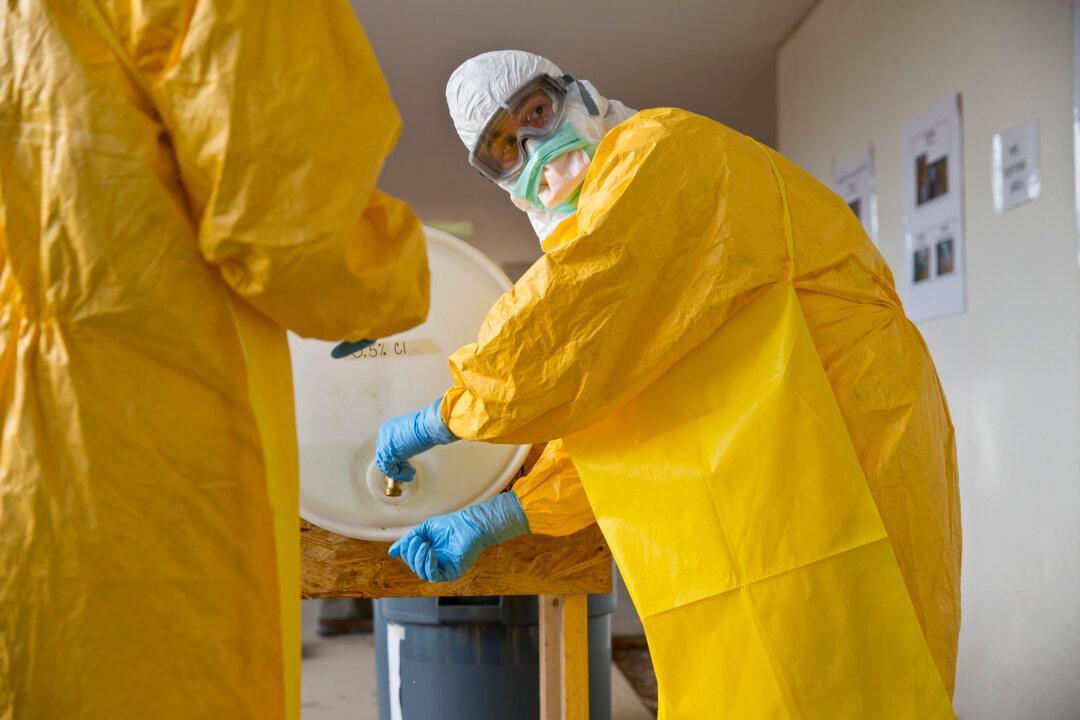Eight hospitals have been chosen by state authorities to defend on the front lines against the spread of Ebola in New York.
These hospitals, which include Mount Sinai on the Upper East Side, Columbia University-affiliated New York-Presbyterian, and Bellevue Hospital Center, the 828-bed public hospital in Midtown Manhattan, will get intensive training first.
The state’s other 200 hospitals will also prepare, but in the event of a confirmed case, the patient would likely be transferred to one of the eight hospitals.
The MTA and Port Authority will also form specialized teams who will be trained and given the expertise to handle patient risk. The Port Authority will also be tasked with coordinating among all state airports and ensuring proper training is in place. Two ambulances will be deployed at all airports at all times to transport potential patients with Ebola.
Unannounced drills will be conducted to test workers at college campuses, subway stations, and other transit areas.
“This is very much a group effort and a group effort and a coordinated effort,” Cuomo said Thursday at an event streamed live from his office website.
According to the most recent data available from the Centers for Disease Control, approximately 88 patients have been the subject of inquiries from New York City. Eleven of these had been in affected areas, but did not have risk exposure factors. One was tested for Ebola and found to be negative. Eight were diagnosed with malaria, one had typhoid fever, and two others had no clear diagnosis.
“Our MO is to err on the side of caution,” Cuomo said. “We are trying to get the entire system up to speed.”
Bellevue Hospital Center is the primary hospital in the city to handle Ebola cases.
In a statement Wednesday the hospital said that it would receive any confirmed patients from within its system of 11 public hospitals. It is also preparing to receive transfers from other New York City hospitals, if needed, in consultation with the city’s Department of Health. It would also receive cases from NYC airports.
Bellevue has prepared four single-bed rooms in its infectious disease ward to receive high-probability or confirmed Ebola cases. It also has a new onsite laboratory to handle possible Ebola blood samples.
The hospital has a long history of being on the front lines of epidemics and emerging public health threats, and managing an isolation unit for diseases, according to the statement.
“No New Yorker should be unduly concerned if we identify an Ebola case in New York,” said Cuomo.
As the agency mobilizes nationally, Bellevue Hospital Center has been designated as New York City’s go-to facility for Ebola treatment. The 828-bed midtown hospital will take any suspected patients that fly into New York City airports, said Ian Michaels, a spokesman - quoted in Bloomberg.
It will also take confirmed patients from the New York City Health and Hospitals Corp., which has 11 hospitals including Bellevue, Jacobi Medical Center in the Bronx and Queens Hospital Center in Jamaica. If other New York hospitals diagnose a patient, Bellevue will take over care if needed after consulting with the city health department, Michaels said.
Currently there are only four hospitals in the U.S. with top-level biocontainment units, according to the CDC. While Bellevue isn’t one of the four, it has set up four isolation rooms within its infectious disease ward, adding additional electrical capacity to the rooms to support intensive care needs, Michaels said.
The hospital has also added a laboratory within the infectious disease ward to handle suspected and confirmed patients’ blood, so samples will not have to be transported to the hospital’s regular laboratory.
Bellevue sees about 115,000 patients in its emergency room every year and is the oldest continually operating hospital in the U.S., according to its website.
Ebola has infected about 8,400 people, killing more than 4,400 in Liberia, Sierra Leone and Guinea. There is no approved cure, and current treatment involves replacing fluids and using antibiotics to fight off opportunistic infections.
List of Designated Hospitals
· Mt. Sinai in Manhattan
· New York Presbyterian in Manhattan
· Bellevue in Manhattan
· Montefiore in the Bronx
· North Shore/LIJ Health System in Nassau County
· Upstate University Hospital in Syracuse
· University of Rochester Medical Center in Rochester
· Stony Brook University Hospital on Long Island


